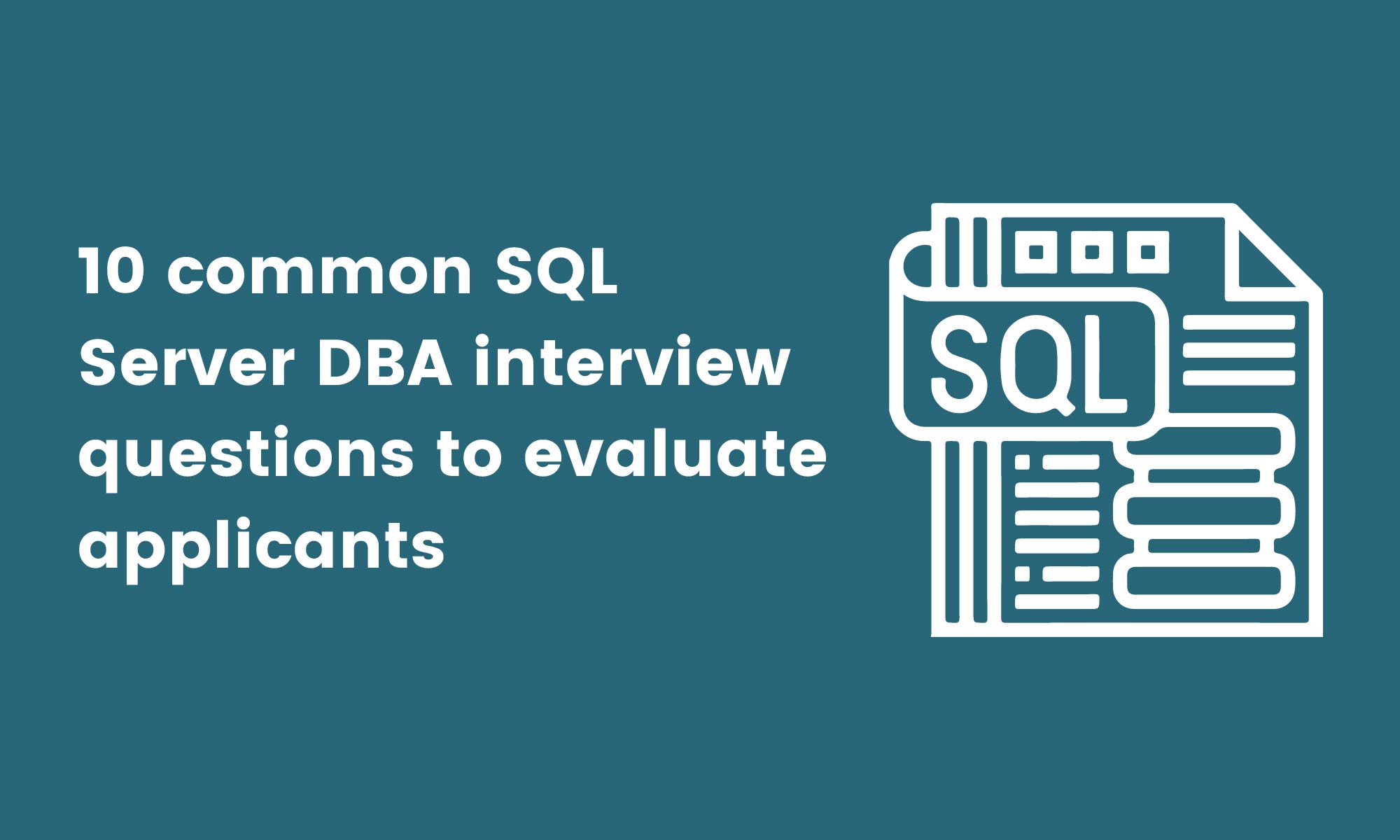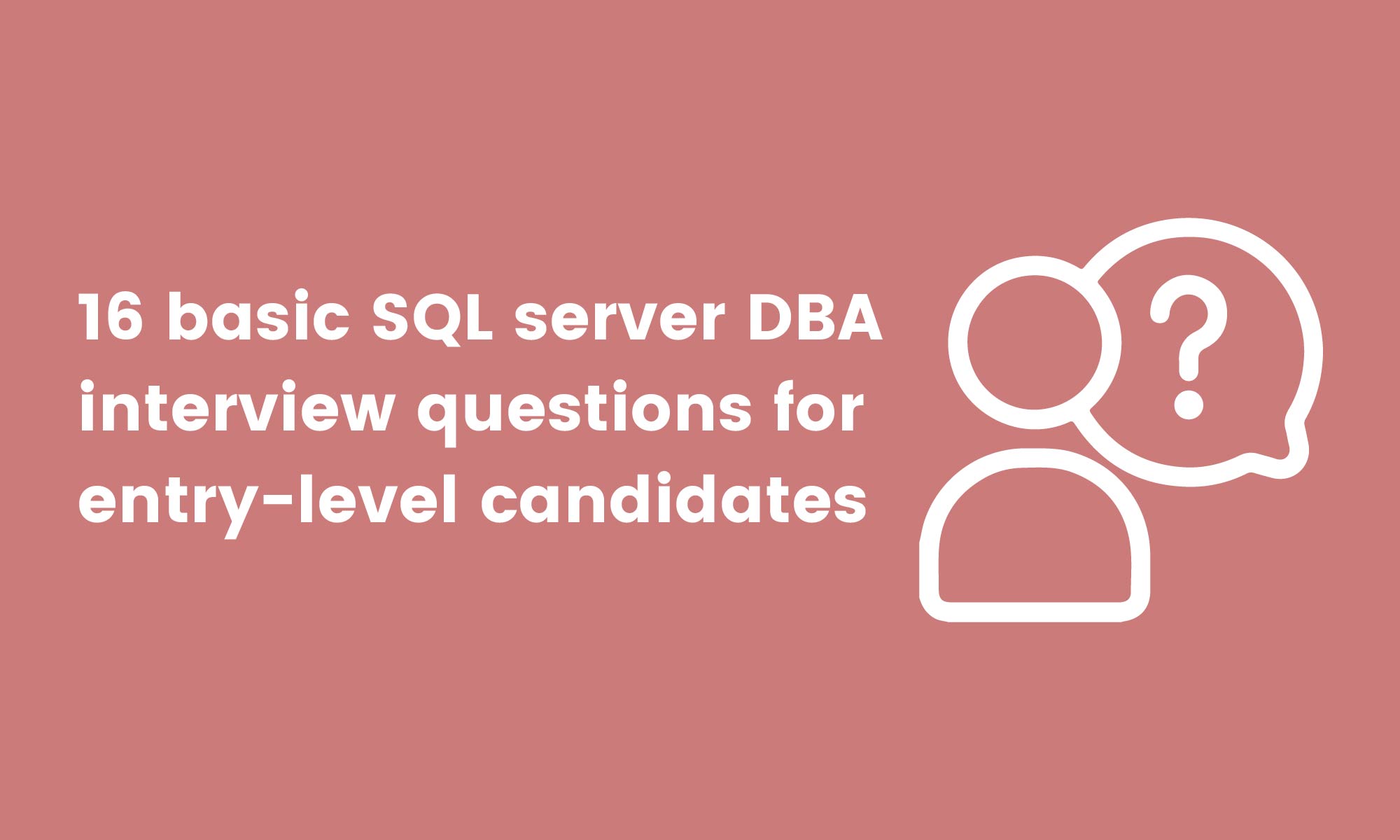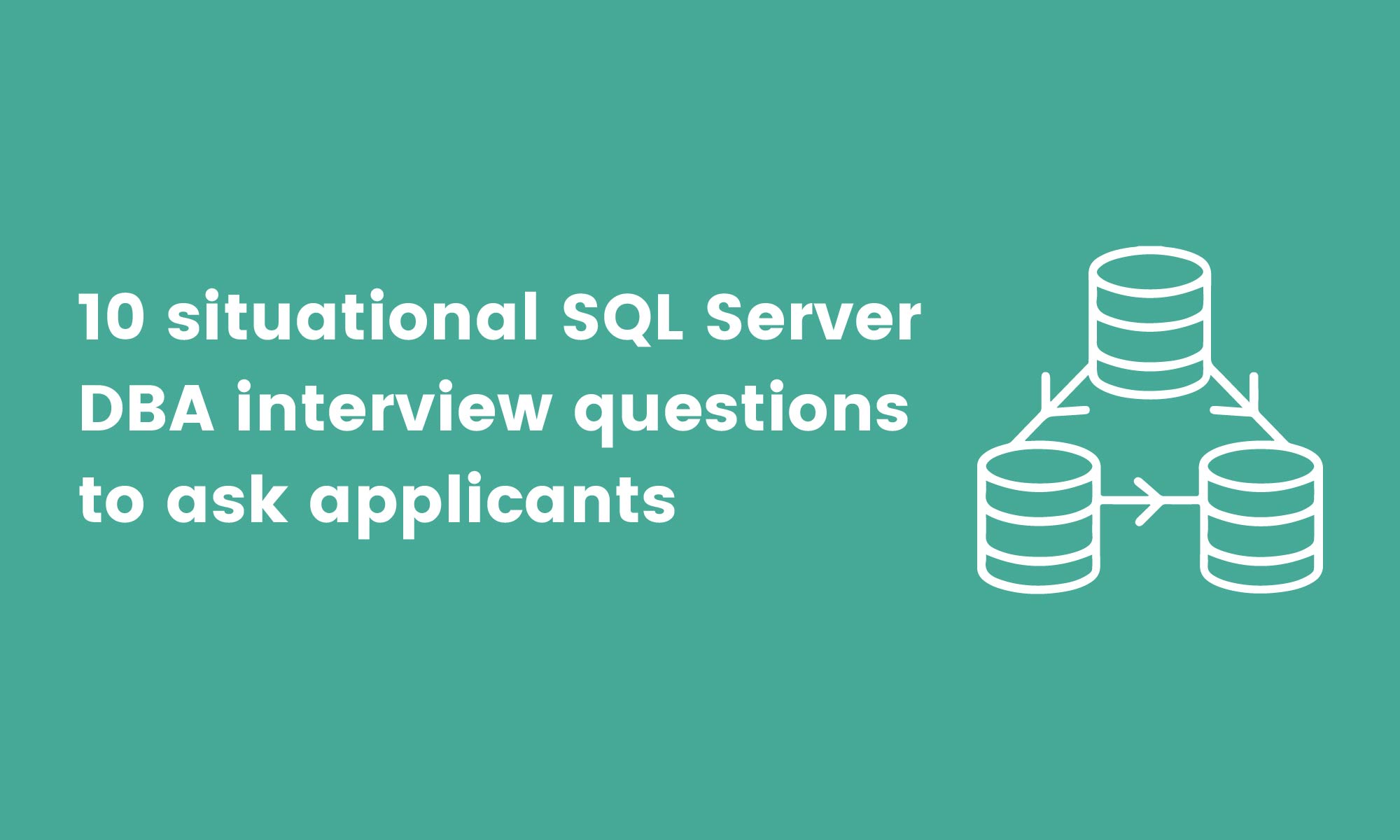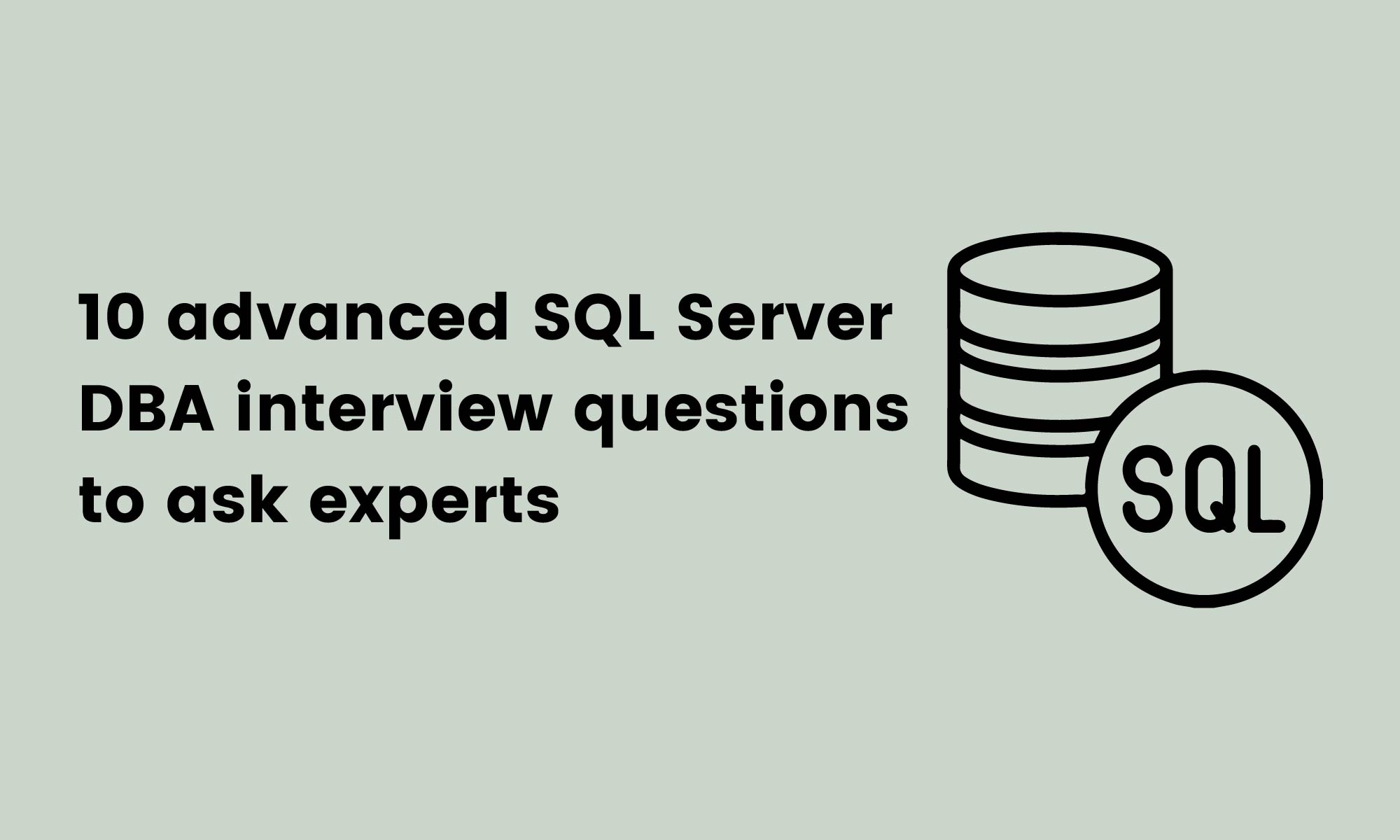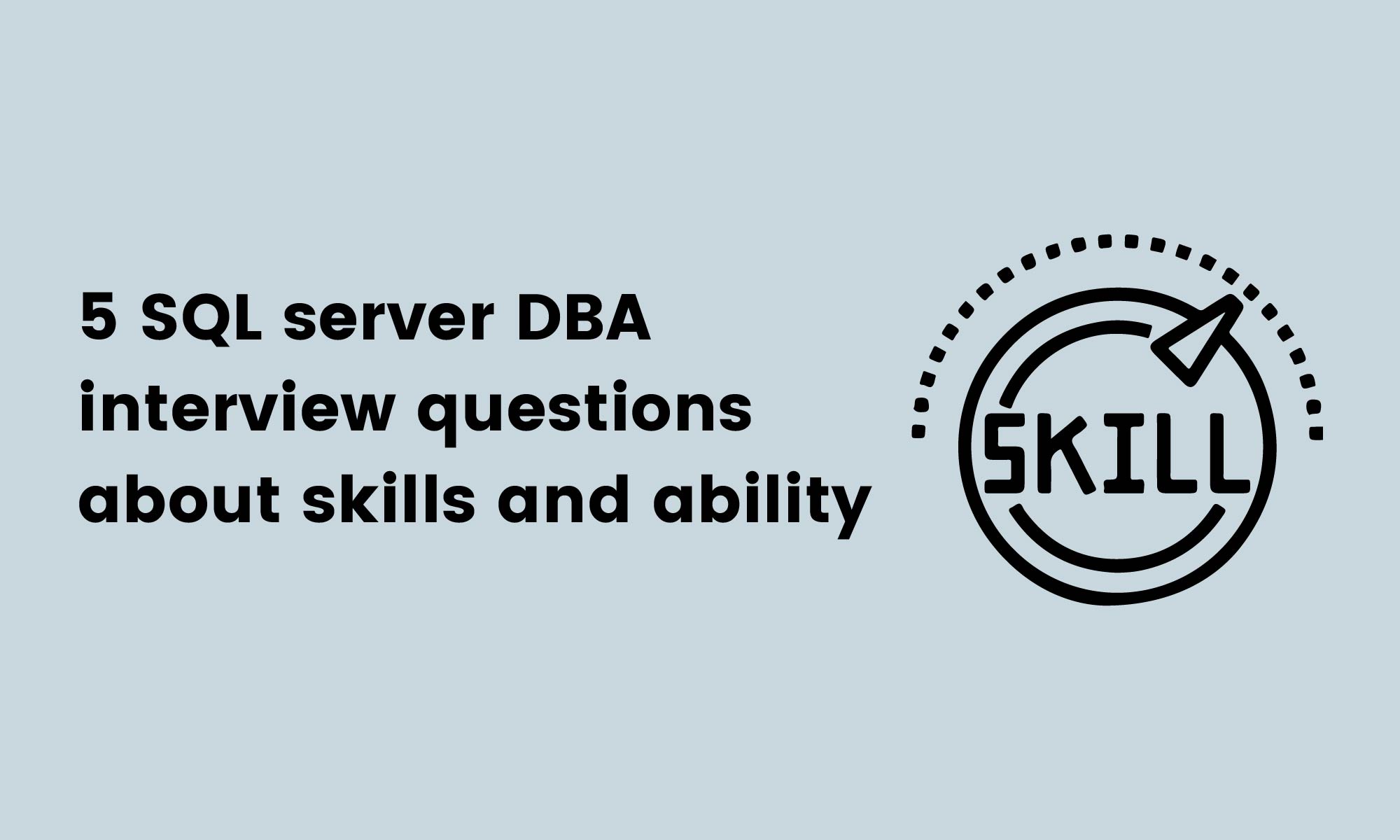51 SQL Server DBA interview questions to quickly evaluate experts
When hiring a database administrator with SQL Server experience, you most likely have two main goals: First, find the right expert with the best SQL Server DBA experience for your organization and second, hire quickly to reduce hiring expenses. So, what’s the best way to achieve both of them?
You don’t need a complicated and lengthy hiring process if you have the right tools at hand: skills assessments and the right interview questions.
First, evaluate applicants’ skills with online skills tests, including an SQL Server test. Then, interview your best applicants to see who truly has the right skills and attitude to succeed at the role.
But what if you’re unsure which questions to ask during interviews? We’ve got you covered! In this article, you’ll find 51 SQL Server DBA interview questions to review and hire top talent.
Table of contents
- 10 common SQL Server DBA interview questions to evaluate applicants
- 5 common SQL Server DBA interview questions and answers
- 16 basic SQL server DBA interview questions for entry-level candidates
- 5 basic SQL Server DBA interview questions and answers
- 10 situational SQL Server DBA interview questions to ask applicants
- 5 situational SQL Server DBA interview questions and answers
- 10 advanced SQL Server DBA interview questions to ask experts
- 5 senior SQL Server DBA interview questions and answers
- 5 SQL server DBA interview questions and answers about skills and ability
- When should you use skills testing and SQL server DBA interview questions?
- Hire an SQL server database admin with our SQL server DBA interview questions
10 common SQL Server DBA interview questions to evaluate applicants
Ask your applicants some of these 10 common SQL Server interview questions to test their general knowledge of SQL Server and database administration.
What is the main reason software engineers use SQL Server model databases?
Describe your experience using SQL Server.
What does DCL mean? Why is DCL important?
Can you outline the meaning of replication for SQL Server?
What does DBCC mean?
Explain what recovery models are for databases.
What makes recovery models important?
What does transparent data encryption mean?
Explain why problem-solving skills are so critical for SQL Server database administrators.
Explain why communication skills are fundamental for SQL Server database administrators.
5 common SQL Server DBA interview questions and answers
Check the answers to these five frequently asked SQL server DBA interview questions to evaluate your candidates’ responses and knowledge.
Explain why problem-solving skills are so critical for SQL Server database administrators.
Problem-solving skills are vital for SQL Server DBAs for several reasons: They help them identify issues, correct them immediately, and implement the right solutions consistently.
If your applicants have the right problem-solving skills, they won’t just stick to predefined procedures – they’ll be able to use their technical and problem-solving abilities to handle the problem effectively.
If you need a more in-depth assessment of your applicants’ capacities to solve problems, you can use our Problem-solving test before hiring.
Explain why communication skills are fundamental for SQL Server database administrators.
SQL Server database administrators must work alongside other team members (such as users and developers) and communicate with them frequently.
Communication is all about using the right communication methods for each group, which is why communication skills are vital for SQL Server DBAs.
You can further assess your SQL server database administrators’ communication skills using our Communication test.
What does transparent data encryption mean?
Skilled applicants will know that technical experts introduced transparent data encryption in 2008 to protect the files of the SQL Server database and prevent unauthorized access.
They will also know that this mechanism is ideal for protecting backups corresponding to specific instances.
What does DBCC mean?
Can your applicants explain that DBCC refers to database console command statements? Can they list four examples of DBCCs?
The main examples you should listen for include maintenance, miscellaneous, validation, and informational DBCC statements. Top responses will also explain what each of these statements and commands enable database administrators to do.
Еxplain what recovery models are for databases.
Interviewees who have strong SQL Server knowledge will know that recovery models control the transaction logging process. They enable database administrators to complete backups and view the available restoration operations.
Applicants may name three kinds of recovery models, including:
Full
Bulk-logged
Simple
The best insights on HR and recruitment, delivered to your inbox.
Biweekly updates. No spam. Unsubscribe any time.
16 basic SQL server DBA interview questions for entry-level candidates
Examine your candidates’ knowledge effortlessly using these 16 basic SQL server DBA interview questions for junior candidates.
Name some of the main differences between MS SQL Server and MySQL.
Explain which kinds of replication SQL Server supports.
Describe the processes or actions that occur at checkpoints.
Explain what correlated sub-queries are.
Name some of the main authentication modes that SQL Server supports.
Have you worked on many SQL Server versions? Which ones have you worked on?
Explain the main indexes you can get in the SQL Server.
In SQL Server, what is a clustered index?
In SQL Server, what is a non-clustered index?
Name four high-availability solutions in SQL Server.
Explain what mirroring means.
What do you know about database security?
What do you know about memory allocation?
Explain what T-SQL means.
Explain what SQL server monitoring means.
What would you do if the server fails to respond?
5 basic SQL Server DBA interview questions and answers
Check the sample answers to five of the most important junior SQL DBA interview questions. Use them as a guide when assessing your potential next database administrator’s responses.
Name some of the main authentication modes that SQL Server supports.
SQL Server’s main authentication modes include mixed mode and Windows authentication.
Database administrators can use mixed mode authentication for SQL Server and Windows authentication.
In contrast, Windows authentication is a default authentication mode granting users access if the system has already verified them.
Describe the processes or actions that occur at checkpoints.
Candidates should know that checkpoints truncate the transaction log until the start of the oldest open transaction, and the system writes the buffer cache’s pages to a disk. They may also explain that by storing the transactions that engineers commit, the cache enhances the performance of the SQL server.
Name four high-availability solutions in SQL Server.
Applicants with top SQL Server DBA knowledge will be able to explain that there are four high-availability solutions in SQL Servers, including replication, log shipping, database mirroring, and failover clustering. Can your interviewees detail each of these solutions and explain what they do?
Explain which kinds of replication SQL Server supports.
SQL Server supports three kinds of replication: transaction, merge, and snapshot:
Transaction replication is a method that monitors transactions as they happen and that the system replicates the changes
Snapshot replication makes a data snapshot that database administrators can deliver to any subscriber, which is ideal if there’s not much data that needs replicating
Merge replication integrates a snapshot for replication seeding; this replication process tracks changes and is commonly used in a client and server scenario, where the server is similar to a repository
Name some of the main differences between MS SQL Server and MySQL.
Some of the critical differences between MS SQL Server and MySQL include the following points:
Microsoft developed the MS SQL server, while Oracle is behind the MySQL server
MS SQL server supports Windows and Linux; MySQL server supports other operating systems such as SolarWinds and OS X
MS SQL Server’s supporting languages include Java, PHP, Ruby, C#, and others, while MySQL server’s supporting languages include Python, JavaScript, Scheme, and Haskell, among others
MS SQL Server has a commercial license permit, while MySQL is open source
10 situational SQL Server DBA interview questions to ask applicants
Ask your candidates some of these 10 situational SQL Server DBA interview questions to learn how candidates respond to complex SQL Server tasks.
Which troubleshooting approach would you use to find SQL Server agent job errors?
Which three commands could you use in DCL?
Explain what the fill factor setting does and when you would use it.
Explain what system databases are and when you would use one.
Explain what user databases are and when you would use one.
Name three essential replication components and outline when you’d use them.
Which method helps differentiate between named and default instances?
Which method would you use to control your index pages’ free space?
Explain how you would trace an SQL server’s traffic.
In which context or scenario would a software engineer or a DBA use SQL Agent?
5 situational SQL Server DBA interview questions and answers
Check the answers to these five situational interview questions to review the responses of your potential new SQL Server database administrator.
Which three commands could you use in DCL?
Applicants should be able to list three commands they can use in data-control language (DCL): GRANT, REVOKE, and DENY. Check whether your candidates can explain each of these commands and why they are important.
Which method helps differentiate between named and default instances?
The easiest method to differentiate between named and default instances is to use the SQL Server configuration manager. Applicants should know that the next steps include selecting SQL Server services and checking what the service is listed as.
For example, if a database administrator sees that the service shows as MSSQLSERVER, they should know this is a default instance and not a named instance.
In which context or scenario would a software engineer or a DBA use SQL Agent?
Your applicants should know that database administrators can schedule jobs at a specified time, on-demand, or after an event triggers them. They should also know that SQL Agent is ideal for scheduling backups and other administrative jobs.
In short, if a database administrator wanted to schedule jobs, they would use SQL Agent to assist them.
Explain what user databases are and when you would use one.
Applicants should know that user databases are types of databases that administrators use if they want to store data. Can your applicants also explain that if database administrators want to work with the stored data, this type of work is possible with a user database?
Explain what system databases are and when you would use one.
A system database is an SQL default database that database administrators can use when they have installed an SQL server. Some examples of system databases your applicants may mention in response to this question include TempDB, model, MSDB, and master.
10 advanced SQL Server DBA interview questions to ask experts
Evaluate whether your candidates’ skills are sufficient for a senior-level database administrator role by asking them some of the questions below.
Name the difference between active-passive and active-active clustering.
What are the key requirements to establish a failover cluster for SQL Servers?
Name a situation when you would use the high-safety mode to mirror a database.
Name a situation when you would use the high-performance mode to mirror a database.
Describe what dropping a database means.
Describe what taking a database offline means.
Name two kinds of upgrades you can perform in SQL Server.
Which method should you use to open a cluster administrator?
Name four ways to create databases in SQL Server.
Name the main database compression types of SQL Servers released in 2008.
5 senior SQL Server DBA interview questions and answers
Check the answers to these five senior SQL Server DBA interview questions and use them to review the responses of your candidates during interviews.
Name four ways to create databases in an SQL Server.
Senior-level SQL Server database administrators should know the four ways to create databases in an SQL server, which are to:
Use T-SQL
Use SQL Server Management Studio
Complete a restoration of a database backup
Copy a database wizard
Name a situation when you would use the high-safety mode to mirror a database.
There’s one situation where database administrators may use the high-safety mode: to guarantee that the mirrored and principal databases are synchronized and ensure the servers commit the transactions simultaneously.
Name a situation when you would use the high-performance mode to mirror a database.
A unique situation when database administrators would use a high-performance mode is when they want the main database to run faster than the mirrored database that commits the transactions.
Describe what dropping a database means.
Can your interviewees explain that dropping a database refers to deleting the database and its physical files? Are they aware that a database administrator cannot get the database back without a backed-up version if they drop it?
Describe what taking a database offline means.
Do your candidates know that taking a database offline refers to making the database unavailable for users? Do they also know that this process doesn’t mean deleting or removing it and that a database administrator can easily revive the offline database and bring it back online?
5 SQL server DBA interview questions and answers about skills and ability
Ask your applicants these five SQL server DBA interview questions to evaluate their overall skills and experience. Check the answers below to see what to expect from your candidates.
As an SQL Server database administrator, how would you grade your problem-solving abilities?
When answering this interview question, applicants should provide examples of their problem-solving skills.
For example, they may say that they thoroughly analyze issues to implement the right actions and eliminate the problems they have found. In the past, your applicant may have had to handle complaints about the database’s performance and needed to regularly monitor the database to solve the issue.
How would your manager grade your communication skills?
Can your interviewees prove their communication skills have impressed the person they currently report to? Can they provide examples of efficient communication?
For example, your applicant may often communicate with users, developers, clients, administrators, or other groups within their organization to solve issues. Are they able to give specific examples of problems they addressed successfully with the help of others?
How would your team members grade your Microsoft SQL Server skills?
Candidates should be able to give examples related to their Microsoft SQL Server proficiency. They may describe a project they have worked on using Microsoft SQL Server or a complex challenge they have solved using this relational database management system.
Don’t forget to review your applicants’ skills using our Microsoft SQL Server test to gain insightful, reliable data that’ll help you make the right hiring choice.
How would the person you report to grade your Python language skills?
Python is one of the essential supporting programming languages for the MySQL relational database management system, so you need to look for applicants whose Python language skills suit your business.
Listen for evidence from your applicants about situations where they have used Python to execute queries or inform the database whether they’ve made any changes to a table.
How would you grade your time-management skills?
The best employees can meet project deadlines and manage time efficiently; the same applies to database administrators.
Do your applicants have an example of how they have managed their time efficiently to complete a complex project? To be sure, test their time management skills with our Time-management test.
When should you use skills testing and SQL server DBA interview questions?
Skills testing and SQL server DBA interview questions can enhance the quality of your hiring process and there’s an optimum time to use them.
Use pre-employment tests (such as our SQL Server test) as soon as you start receiving applications for database administrators with SQL Server experience. You can combine the SQL Server test with up to four other tests, such as our Critical Thinking skills or Culture Add tests, for a more thorough review of your candidates’ abilities and attitude.
Once you’ve received the results from your applicants’ skills tests, you should move on to the interview phase, during which you can use the SQL server DBA interview questions from this article.
Structuring your hiring process in this way is the ideal way to:
Save time and effort by not screening résumés
Reduce the chances of making a bad hire
Choose the best database administrator for your organization
Hire an SQL server database admin with our SQL server DBA interview questions
Who will be your next SQL server database administrator?
Find the best person for the role by reviewing your applicants’ skills and inviting the most knowledgeable applicants to an interview afterward. The fastest way to complete both these steps is to use our SQL Server skills test and the interview questions from this article.
Hire an expert SQL server database admin with skills assessments and our interview questions, and never again waste time, money, and energy on complex hiring processes.
You've scrolled this far
Why not try TestGorilla for free, and see what happens when you put skills first.


